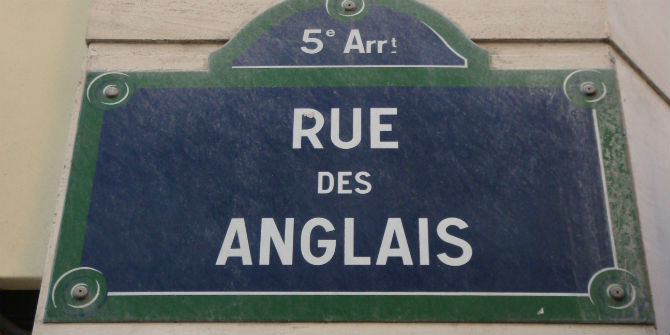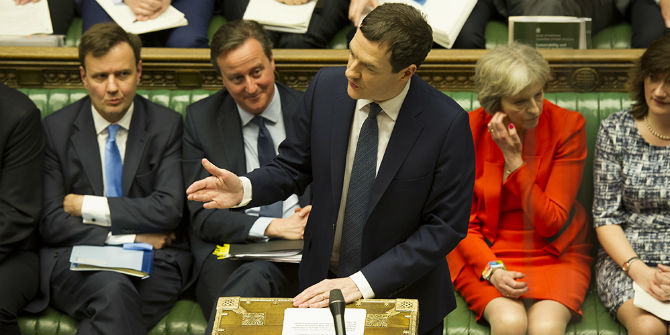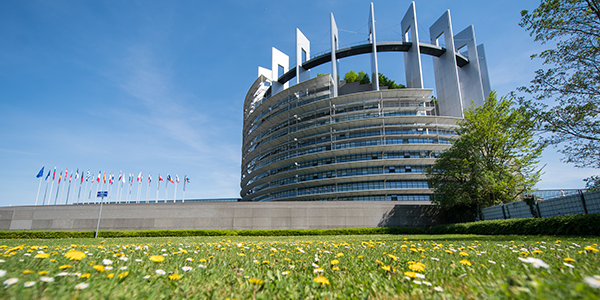 Do the French care about Brexit? Less than they did, according to Nathalie Duclos (University of Toulouse). Among pro-Europeans, Britain has long been regarded as holding back the European project; and Eurosceptics are keen to see the weakening of the Union.
Do the French care about Brexit? Less than they did, according to Nathalie Duclos (University of Toulouse). Among pro-Europeans, Britain has long been regarded as holding back the European project; and Eurosceptics are keen to see the weakening of the Union.
“Donnez-moi un break…” That was Boris Johnson’s typically self-satisfied response to the accusation that it was anti-democratic to prorogue Parliament for five weeks right before the Brexit deadline. One can understand why Johnson felt the need to resort to one of his well-rehearsed jokes at a time of political turmoil, probably in the hope of conjuring up his old public persona as a witty speaker. And well-rehearsed the joke was, Johnson having publicly made it since at least March 1994, 25 years before the first Brexit deadline. During the EU referendum campaign, “Donnez-moi un break, as we say in Brussels” was the then London mayor’s flippant response to the then French minister for the economy Emmanuel Macron after he had warned that France could end the UK-French arrangement over Calais (which allows UK border controls on the French side) if Britain voted to leave the EU.

It seems ironic that Johnson should regularly ask to be given a break in the language of those same Europeans that have been the least inclined to give the UK one. At least, “bad cop” is how France has often been cast in the Brexit drama. During Johnson’s first official visit to France as Prime Minister in August 2019, President Macron acknowledged that he was “always portrayed as the toughest of the (EU) lot”, and Johnson himself is on record saying that the French were out to “shaft” the British over Brexit.
Johnson’s idea was that France, smelling blood, would do all it could to draw economic benefits from Brexit and attract City firms to Paris. That much is obvious, but how does it make Paris different from Frankfurt, which is also expected to capitalise on Brexit? If the idea is to prove that the French are uniquely placed to benefit from Brexit, perhaps more relevant is the fact that France should gain an extra five seats in the European Parliament as soon as the UK leaves, while the number of German seats, for instance, will remain the same. Still, France is not the only country to benefit, with Spain also poised to gain five more seats. Behind Johnson’s unflattering comment was also the idea that facing a difficult domestic context, Macron would try to carve out an independent position in Europe on the back of the British. But how much leeway has France really had to develop an independent position in the Brexit negotiations, considering how united a front the EU has always strived to present?
Arguably, France’s main specificity is in how willing it has been to insist that no deal was always a possibility (and one for which it was ready). At a European summit on 2 July 2019, Macron exhorted the EU “not to be afraid of a no deal” if it didn’t want to become “the hostage of the opposite camp”. A few days before Johnson’s official visit to France in late August, Macron made it known that he now considered no deal as “the central Brexit scenario”, before hitting a more conciliatory note after German Chancellor Angela Merkel declared that a deal was still possible.
More radically, France has also been the only EU member state to argue that no deal is preferable to some of the other options, and in particular to being stuck in the eternal purgatory of Brexit extensions. When Theresa May made her first extension request a few days before the original Brexit deadline of 29 March 2019, France warned that it would “turn the extension request down and prefer a no deal exit” if “Mrs May was not able to give the European Council sufficient guarantees about the credibility of her strategy” . A few weeks later, when the UK made its second extension demand, Macron single-handedly campaigned against a long Brexit delay. This was all the more remarkable for being the only time in several years of UK-EU negotiations that the Europeans had not presented a united front on Brexit.
Macron justified France’s position (which was shared by only three other EU member states: Belgium, Luxembourg and Malta) by saying that “a choice has been made by the British people” and that there was no point in dragging things out in the hope of getting around what they had decided. His insistence on the need to respect the British people’s sovereign choice must be understood in the context of the long-lasting damage done in France to the image of the EU, to French mainstream parties and to representative democracy when the French Congress validated what was to be known as the Lisbon Treaty, thereby going against the will of a majority of French people as expressed in a referendum of 2005.
Macron also made it clear that to him, a UK with one foot in the EU and one foot out constituted an obstacle not just to the everyday functioning of the EU (which already made such a scenario “not preferable to no deal”), but more widely to the European project and to the “European Renaissance” that he believed was needed. The Gaullian understanding of the UK as a hindrance to the European project is obviously not dead, and it is not totally uncommon for senior French politicians to openly rejoice at the possibility of the UK leaving the EU. In October 2019, in a rare interview since his resignation as head of the IMF over allegations of sexual assault, former minister Dominique Strauss-Kahn described himself as a Brexiter, saying that “the difficulty in building Europe for the past forty years has been linked in great part to the presence of our British friends, who have never really wanted to play the game”. As early as 2014, when a Brexit referendum was still only a pledge, former Prime Minister Michel Rocard wrote an article with the title “A French message to Britain: get out of Europe before you wreck it”, in which he bluntly blamed the UK for “never allow[ing] the slightest deepening of the [European] union”, as a result of which it had “remained bogged down and badly run, an economic giant, a political dwarf.”
Do ordinary French people share some of their elected representatives’ less than charitable position on Brexit? According to the BVA institute, a few months before the EU referendum, a clear majority of French respondents wanted the UK to remain in the EU, against around 40% who wanted it to leave; by contrast, in late March 2019, at the time of the first Brexit deadline, a majority supported either a “hard” or a “soft” Brexit, with only 27% altogether opposed to the UK leaving the EU. However, what these polls have also made clear is that what French people think about Brexit varies a lot according to their domestic political sympathies, with supporters of the pro-EU parties opposing Brexit and the Eurosceptic Rassemblement National (formerly Front National) making up the most pro-Brexit group. (The only shift has been in the position of the supporters of the conservative Républicains, who went from being anti-Brexit to mainly wanting a “hard Brexit”; however, this is likely to be a reflection of the evolution in the nature of support for the Républicains (who have lost many of their centrist, pro-EU sympathisers to Macron’s La République en Marche) more than anything else.) This suggests that people’s positioning on Brexit is based on their positioning on the EU.
Most French people now seem to support Brexit. Whether they take a more hardline position than citizens of other EU member states is more questionable. A poll conducted in August 2017 across seven European countries (including the UK and France) showed that outside of the UK itself, France was the only country with majority support for Brexit. However, it must be noted that the five other countries surveyed were Northern European states (Germany, Denmark, Sweden, Norway and Finland), including one (Norway) which is not even part of the EU. Perhaps more reliable was a poll conducted in late September 2019 in six EU countries (France, Germany, Spain, Poland, the Netherlands and Ireland) which showed that France was the country with the highest proportion of people who think Brexit is “a good thing” (20%, compared to 8% in Germany, for instance), though most people continued to see it as “a bad thing” (40%). When asked whether the UK should be able to renegotiate a withdrawal agreement with the EU and whether it should be given a new extension, a majority of French respondents took a hardline position. However, and perhaps surprisingly, this was the case for an even greater proportion of Germans, of which almost two-thirds rejected a new agreement and a full two-thirds rejected a new extension. If the French are Brexit bad cops, then they don’t seem to be the only ones anymore.
It could be argued that, beyond those specific constituencies for whom Brexit is a potentially life-altering event (foremost among whom are the numerous British citizens living in France, as well as the fishermen of Normandy and Brittany), what marks France out compared to some other EU countries, and most significantly Germany, is the proportion of its citizens who are rather indifferent to Brexit. Most polls present people with a binary choice between supporting or opposing (different types of) Brexit, but that tells us nothing about whether people care about Brexit or not. Those rare polls that have offered people the option of declaring their indifference to Brexit have shown it to be a rather popular option. In the immediate wake of the EU referendum, when asked what the referendum results inspired them “on a personal level”, most French people (37%) said that they felt “worried”, but one out of five (20%) felt “indifferent” . A year later, when asked “which of the following emotions” they would feel “if Britain announced that it was now going to stay in the EU after all”, a majority now opted for the word “indifferent” (though a small majority of 23%); by contrast, most of the German respondents went for the words “relieved” (23%) and “pleased” (22%).
Last but not least, in February 2019, no less than 28% of the French believed that the UK had already left the EU (compared to only 12% of Germans), which does not exactly signal widespread interest in the Brexit process. This also reflects the fact that, as the UK is outside the eurozone and the Schengen area, and as the euro and the lack of border checks are the main visible symbols of EU membership in France, the UK has never been perceived as a full EU member state by the French. And yet, as the historian Robert Tombs notes, throughout their histories, France and the UK have rarely been “indifferent to what the other says and does”. I suspect Brexit won’t be enough to turn the “best enemies” into casual acquaintances.
This post represents the views of the author and not those of the Brexit blog, nor LSE.
Nathalie Duclos is a Professor in the Laboratoire cultures anglo-saxonnes at the University of Toulouse.







1 Comments